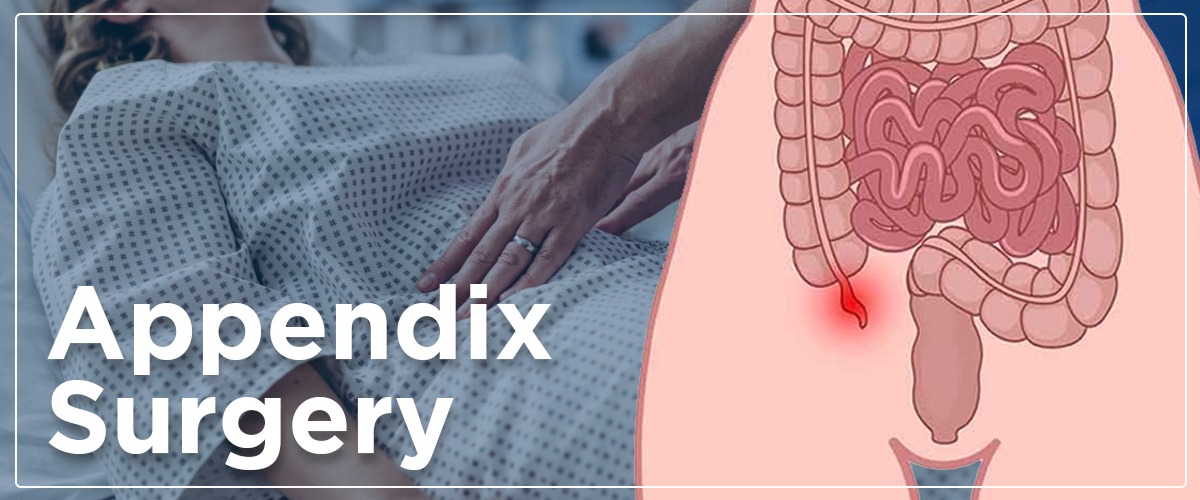
A small tubelike organ, the appendix is connected to the lower part of the large intestine. The function of the appendix is unknown and largely many people are unaware that they even have an appendix, until it gets inflamed – a condition known as appendicitis. Once inflamed, the appendix is filled with pus. It swells, and if not treated immediately can rupture and spread the bacteria into the abdominal cavity which can lead to peritonitis, a severe infection requiring urgent medical care. In cases where the infection spreads into the bloodstream, the condition can become life-threatening. Therefore, it’s important to understand the warning signs of appendix to seek immediate medical attention.
Minimally invasive laparoscopic appendectomy is a relatively safe procedure. To schedule a consultation at Felix Hospital, the best hospital for appendicitis treatment, contact us at +(91) 9667064100.
Understanding the Disease
As mentioned, appendicitis is an inflammation of the appendix, a small, tubular pouch that sticks out from the colon on the lower right side of the large intestine. Although anyone can develop appendicitis, it is commonly seen in people between the age group of 10 and 30. Appendicitis commonly results in swelling and discomfort and requires appendix removal surgery as treatment.
Causes
Appendicitis is an acute condition and painful, It can be caused by a number of factors which include:
Common Signs You Need an Appendectomy
Symptoms of appendicitis include a swollen belly, severe pain near the belly button which shifts to the lower right abdomen and increases in intensity with time. Other common signs you need an appendicitis surgery or appendectomy includes:
In addition to the symptoms listed above, there are other diagnostic signs which healthcare professionals look for when diagnosing appendicitis. These include:
Treatment
Surgical Management
Appendectomy: The primary treatment for appendicitis is surgical removal of the appendix (appendectomy), often preceded by antibiotics to reduce infection risk. An appendectomy can be performed via an Open appendectomy, i.e., where a single incision is made in the lower right abdomen to remove the appendix or a laparoscopic appendectomy, i.e., where several small incisions are made, and a camera is inserted to guide the removal of the appendix. This minimally invasive procedure generally results in quicker recovery, less scarring, and reduced post-surgical pain.
After the surgery patients are advised to avoid strenuous activities for two to four weeks, get adequate rest, take their medicines as prescribed, keep their incision site dry and clean to prevent infection and gradually transition from light food to their regular diet.
Prevention
Unfortunately, appendicitis is not a preventable condition, however following a healthy lifestyle can reduce the risk. A high fibre diet to ensure regular bowel movements, adequate hydration to prevent constipation and routine health checkups for persistent digestive issues can help in early detection and timely treatment.
Meet Our Best Doctors
At Felix Hospitals, the best hospital for appendix removal surgery, our surgeons provide the best possible surgical treatment and care to the patients. Our team of highly skilled and experienced surgeons, led by Dr Ritesh Agarwal, and Dr Vishal Sharma, is dedicated to delivering the highest quality care using advanced surgical techniques. Our state-of-the-art facilities are equipped with cutting-edge laparoscopic equipment and advanced technology, ensuring precise and efficient procedures.
Conclusion
Even though the appendix seems like an insignificant organ, its inflammation causes intense pain and can lead to very serious complications if not caught and treated early. The swift and effective management of appendicitis underscores the importance of medical intervention in acute conditions. Recognising the warning signs, as mentioned above, is extremely important, especially since these symptoms are often mistaken for other digestive issues.
Modern medicine has made the diagnosis and treatment of appendicitis smoother and less invasive. In fact, with the latest surgical techniques and post-operative care, most patients recover fully and lead healthy lives without long-term consequences.